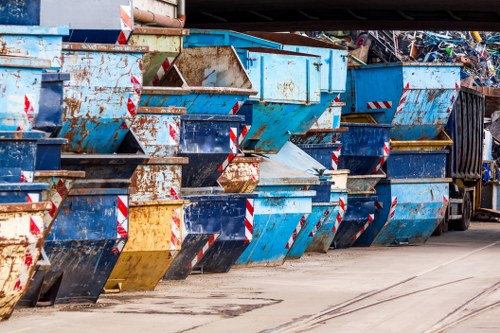White Goods Recycle Deptford: Sustainable Solutions for Your Home Appliances

Recycling white goods in Deptford is essential for both the environment and your community. White goods, such as refrigerators, washing machines, and dishwashers, contain materials that can be harmful if not disposed of properly. By choosing to recycle these appliances, you contribute to reducing waste, conserving resources, and minimizing pollution.
Deptford offers a variety of recycling centers and services dedicated to handling white goods responsibly. Whether you're upgrading your appliances or disposing of old ones, understanding the recycling options available can help you make informed decisions.
In this guide, we'll explore the best practices for recycling white goods in Deptford, the benefits of doing so, and the nearby areas where you can access recycling facilities. Our goal is to provide you with comprehensive information to make the recycling process smooth and efficient.

Why Recycle White Goods?
Recycling white goods offers numerous benefits:
- Environmental Protection: Prevents harmful chemicals from entering the environment.
- Resource Conservation: Recovers valuable materials for reuse.
- Energy Savings: Reduces the energy required to produce new appliances.
- Economic Benefits: Creates jobs in the recycling and manufacturing sectors.
By recycling, you play a part in creating a sustainable future and supporting the local economy.
Moreover, many recycling programs in Deptford offer incentives, such as discounts on new appliances, making it financially beneficial as well.

How to Recycle White Goods in Deptford
Recycling white goods in Deptford is straightforward with several options available:
- Local Recycling Centers: Facilities where you can drop off your old appliances.
- Professional Pick-Up Services: Companies that collect white goods from your home.
- Retailer Take-Back Programs: Some stores offer recycling when you purchase a new appliance.
Before recycling, ensure that your appliance is clean and, if possible, remove any personal items.
Understanding the correct disposal methods will help you avoid potential fines and contribute positively to the environment.

Top Nearby Areas for White Goods Recycling
Deptford is surrounded by several areas that also offer excellent recycling services:
- Lewisham: Just north of Deptford, Lewisham provides multiple recycling centers with extended hours.
- New Cross: Known for its community-driven recycling initiatives.
- Peckham: Offers both drop-off points and pick-up services for convenience.
- Abbey Wood: Features state-of-the-art recycling facilities specializing in large appliances.
- Blackheath: Combines recycling with educational programs on sustainability.

These nearby areas enhance the accessibility of white goods recycling for Deptford residents, ensuring that environmentally responsible disposal is always within reach.
Each area has unique features, such as specialized facilities in Abbey Wood and community programs in Blackheath, catering to various recycling needs.
By leveraging these nearby resources, you can efficiently recycle your white goods without hassle.
Benefits of Choosing Deptford for Recycling
Deptford stands out as a prime location for white goods recycling due to its strategic position and comprehensive services. The town's commitment to sustainability is evident through its well-maintained recycling centers and supportive community programs.
Residents benefit from easy access to multiple recycling options, whether they prefer drop-offs at local centers or the convenience of pick-up services.
Additionally, Deptford's recycling facilities are equipped with the latest technology to ensure that appliances are processed efficiently and safely.
Eco-Friendly Practices in Recycling
Adopting eco-friendly practices in recycling helps minimize environmental impact. Deptford's recycling centers prioritize reducing emissions, conserving energy, and ensuring that materials are reused responsibly.
By choosing to recycle white goods, you support these initiatives and contribute to a cleaner, healthier environment for future generations.
Implementing sustainable recycling methods is a collective effort that requires participation from the entire community.
Tips for Effective Recycling
- Plan Ahead: Schedule pick-ups or know the operating hours of local centers.
- Prepare Appliances: Ensure appliances are clean and free of personal items.
- Understand Guidelines: Familiarize yourself with recycling regulations in Deptford.
- Donate if Possible: Some appliances are still functional and can benefit others.
Following these tips can enhance the efficiency of the recycling process and ensure that your white goods are disposed of properly.
Moreover, being informed about the correct procedures helps avoid common mistakes and facilitates a smoother recycling experience.
Frequently Asked Questions
1. What are white goods?
White goods refer to large household appliances such as refrigerators, washing machines, dishwashers, and ovens. These items are typically white in color but the term encompasses all major home appliances.
2. How can I schedule a pick-up for my white goods in Deptford?
You can schedule a pick-up by contacting local recycling centers or professional recycling services in Deptford. Many companies offer online booking and flexible scheduling options to accommodate your needs.
3. Are there any costs associated with recycling white goods?
Some recycling services may charge a fee, while others offer free pick-up or drop-off. Additionally, retailer take-back programs might provide discounts on new appliances when you recycle your old ones.
4. Can I recycle a non-functional appliance in Deptford?
Yes, non-functional appliances can be recycled. Recycling centers are equipped to handle appliances regardless of their working condition, ensuring that harmful materials are properly managed.
5. What happens to white goods after they are recycled?
After recycling, white goods are disassembled, and their materials are sorted for reuse. Metals, plastics, and other components are processed and repurposed, reducing the need for new raw materials and minimizing environmental impact.